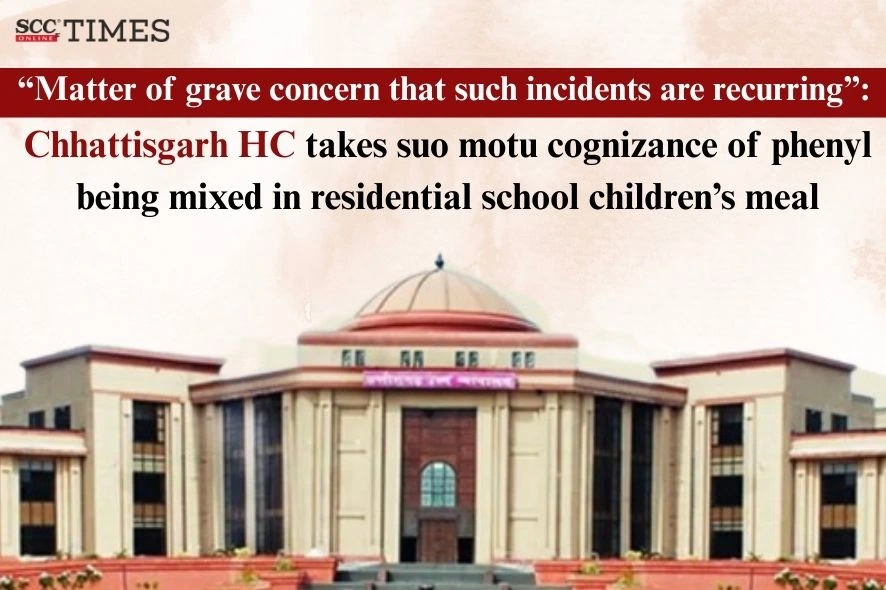Chhattisgarh High Court: In a suo motu writ petition registered regarding malnutrition of children in Anganwadi centres, the Division Bench of Ramesh Sinha, CJ., and Bibhu Datta Guru, J., took note of a recent instance of phenyl being mixed in the meal prepared for the students at a residential school. The Court remarked that it was a matter of grave concern that such instances of children’s food being contaminated/ spoiled were recurring. Accordingly, the Court directed the Chief Secretary of Chhattisgarh to issue appropriate instructions to all the stakeholders and file an affidavit before the next date of hearing regarding the steps taken by him.
Background
On 28-08-2023, the present case was registered after a suo motu cognizance was taken of a news item regarding malnutrition of children in Anganwadi centres.
During the pendency of this case, a news report was published on 26-08-2025 in the Hindi Daily, Navbharat, regarding an incident of phenyl being found in the meal cooked for 426 students at the Pakela Residential Potacabin School, Sukma. As per the news report, when the meal, around 48kgs of beans, was about to be tasted by the teachers, a strong odour of phenyl was detected.
The incident was immediately ordered to be enquired into by the Collector, Sukma, who constituted a team comprising the Sub Divisional Magistrate, one DMC, and APC. The students stated that the act of mixing phenyl in the food was done by a Teacher posted there. One student allegedly saw a person, covering his face with a scarf, mixing something in the vegetables.
Analysis
At the outset, the Court remarked that the magnitude of the incident was shocking.
“Had the contaminated food been consumed by the students, it is beyond imagination what devastation it would have caused to the lives of their parents and families, who repose their faith in the residential school system, believing that their children would be cared for like their own.”
The Court added that such an incident, if not promptly detected, could have shattered the confidence of society that students are safe in schools.
The Court directed the State to place the enquiry report of the enquiry ordered by the Collector before the Court, as the aforesaid act was not only an act of negligence, but also a criminal act which put the lives of the students at stake.
“It is a matter of grave concern that incidents of such nature are occurring repeatedly where the food meant for consumption of the students/small children either are prepared in unhygienic conditions or are being contaminated by dogs or other animals, and the said food is allowed to be served to the children, thereby risking their lives.”
Thus, the Court directed the Chief Secretary to issue appropriate instructions to all the stakeholders, who were involved either in preparing or serving food/edible items for Schools, Hostels, Anganwadi Centres, or any such places where small children/students were supplied food, that the same shall be cooked in a clean environment and in a hygienic manner while taking all due precautions so that the same was not in any way. Even the slightest act of negligence could pose a serious threat to the lives of the children, which would cause severe embarrassment to the State and administration. The Chief Secretary, while issuing instructions, may take into consideration the following points:
-
Food Safety Protocols
-
Daily tasting and certification by teachers/wardens before serving food.
-
Maintenance of a “Tasting Register” signed by the teacher and the cook.
-
-
Kitchen and Storage Hygiene
-
Kitchens and storerooms to be inspected at regular intervals by Designated Officers.
-
Chemicals (like phenyl, pesticides, detergents, kerosene) are to be stored separately, away from food storage and cooking areas.
-
Locks and sealed containers for grains, pulses, oils, and vegetables.
-
-
Supervision and Accountability
-
Appointment of a Nodal Officer in every District to oversee food safety in Schools/ Hostels/ Anganwadi Centers.
-
Fixing personal accountability of the Headmaster/ Principal/ Warden for lapses.
-
-
Security and Access Control
-
Restriction of access of unauthorised persons to kitchen premises during and after cooking.
-
Installation of CCTV cameras in the kitchen and dining areas of residential schools/large hostels.
-
Surprise inspections.
-
-
Training and Awareness
-
Regular training for cooks, helpers, and staff on food safety, hygiene, and handling of chemicals.
-
Sensitisation of teachers and staff to report suspicious activities immediately.
-
-
Medical Preparedness
-
First-aid kits and basic antidotes to be available in all hostels/schools.
-
Tie-up with the nearest PHC/CHC for emergency medical assistance.
-
Mock drills on emergency response in case of food poisoning.
-
-
Community and Parent Involvement
-
Constitution of a Parent-Teacher Monitoring Committee for food safety.
-
Review meetings with parents/community representatives at regular intervals (may be monthly/quarterly/half-yearly).
-
-
Criminal Accountability
-
Directions that any incident of deliberate contamination of food be immediately reported to the police and registration of FIR under the relevant provisions of IPC/BNS.
-
-
Reporting Mechanism
-
A State-level helpline or complaint mechanism for reporting food quality/safety lapses.
-
Mandatory reporting of every incident, however minor, to the District Education Officer and Collector.
-
-
Regular Audit and Review
-
Quarterly/half-yearly/yearly independent audit of Mid-Day Meal/Hostel food schemes by Food Safety Officers.
-
The Court further directed that while issuing such instructions by the Chief Secretary, it shall further be made clear that any lapses on the part of the responsible authorities would be viewed seriously, and they should be more vigilant and careful while preparing and serving the food to the students.
Accordingly, the Court directed the Chief Secretary to file an affidavit before the next hearing regarding the steps taken by him.
The matter was listed for 17-09-2025.
[In the Matter of Suo Moto Public Interest Litigation v. Chief Secretary, 2025 SCC OnLine Chh 8467, decided on 26-08-2025]
Advocates who appeared in this case:
For the respondent: Advocate General Prafull N Bharat and Additional Advocate General Y.S. Thakur


